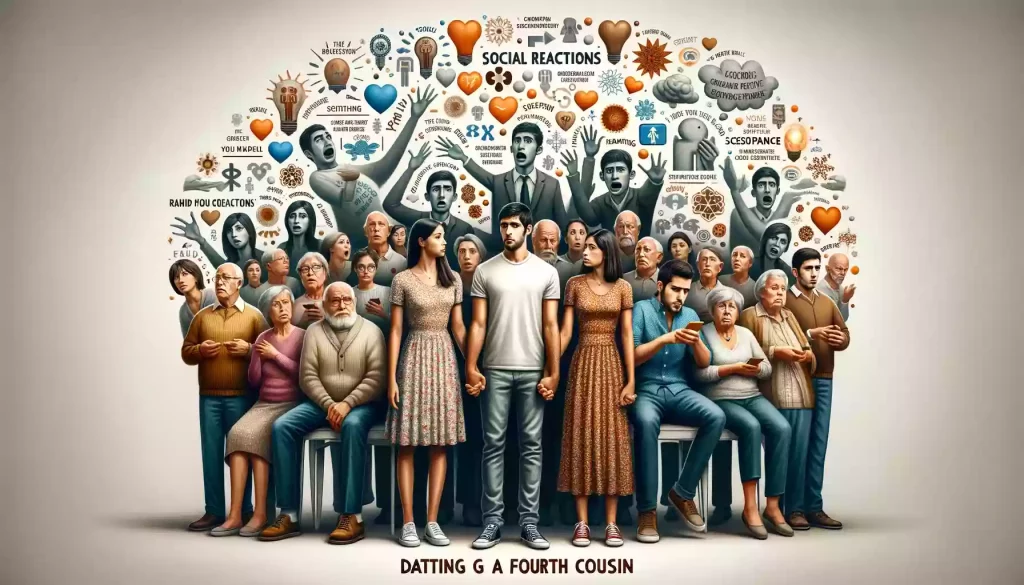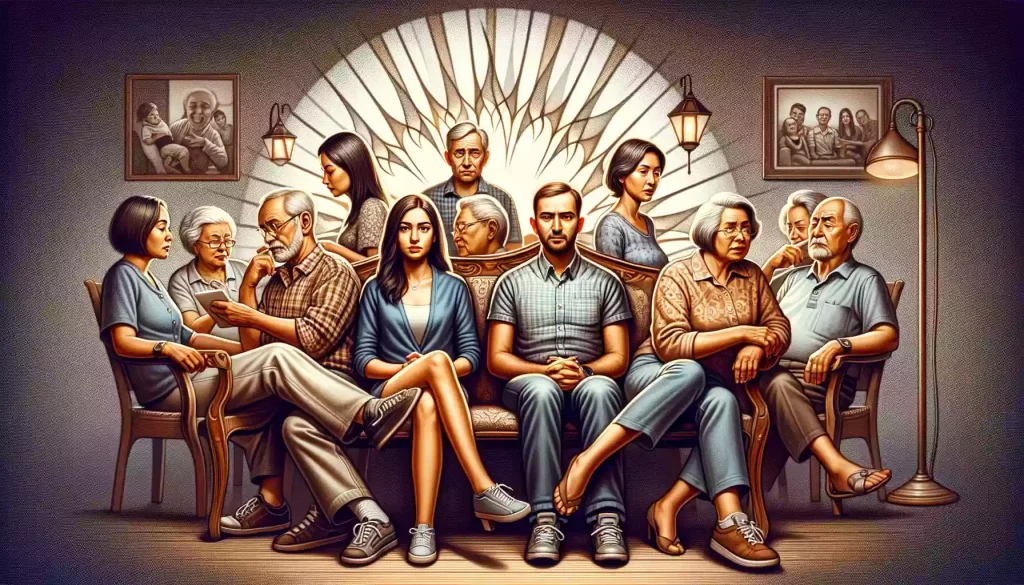Key Takeaways:
- Understanding the nuances of dating a fourth cousin involves considering genetic, legal, and cultural factors.
- Cultural norms greatly influence perceptions and acceptability of fourth cousin relationships.
- Effective communication and managing social reactions are key in navigating such relationships.
- Legal considerations vary by region, highlighting the importance of being informed about local laws.
- Success in fourth cousin relationships is possible with mutual understanding and respect for family dynamics.
Understanding the Dynamics of Dating a Fourth Cousin
When it comes to the topic of dating a fourth cousin, it's essential to first understand the dynamics involved. This type of relationship may seem unusual to some, but it's relatively common in various parts of the world. The closeness of the genetic relationship between fourth cousins is quite distant, making this connection different from those with closer familial ties.
The concept of dating a fourth cousin can be intriguing due to the blend of familiarity and distance in the relationship. This unique dynamic often leads to a mix of comfort in knowing the shared family background, coupled with the novelty of exploring a relatively new personal connection. Understanding this balance is crucial for those in such relationships to navigate their circumstances effectively.
It's also important to consider the family's reaction. While some families might be open and accepting, others may have reservations or even objections. Navigating these family dynamics requires sensitivity, open communication, and sometimes, a bit of diplomacy. Couples in such relationships often find themselves explaining their connection to family members, balancing the need for privacy with the importance of transparency.
Another aspect of dating a fourth cousin is the impact on the extended family network. Such relationships can either strengthen family bonds or, in some cases, create tension. Couples should be prepared to deal with various reactions from relatives, ranging from support to surprise, or even disapproval.
Lastly, the personal implications of dating a fourth cousin cannot be ignored. Individuals must assess their feelings, consider the potential challenges, and weigh the benefits of such a relationship. It's a deeply personal decision that requires introspection and honest evaluation of one's values and desires.
Cultural Perspectives on Dating a Fourth Cousin
Cultural perspectives play a significant role in how dating a fourth cousin is viewed and accepted. In some cultures, marrying within the extended family is a long-standing tradition, often seen as a way to strengthen family ties and ensure compatibility.
In contrast, other cultures may view dating a fourth cousin with skepticism or disapproval. The cultural taboo surrounding cousin relationships in these societies often stems from concerns about genetic risks or societal norms. Understanding these cultural differences is vital for couples in such relationships, especially if they belong to different cultural backgrounds.
Historically, many royal and aristocratic families encouraged marriages between cousins, including fourth cousins, to maintain wealth, status, and power within the family. This historical context provides insight into why such relationships are more accepted in certain cultures and communities.
Religious beliefs also influence perceptions of fourth cousin relationships. Some religions expressly forbid cousin marriages, while others are more lenient or even supportive of such unions. Couples must navigate these religious aspects, which can add another layer of complexity to their relationship.
Globalization and increased cultural exchange have also impacted perspectives on fourth cousin relationships. Exposure to different cultures and norms has led to a gradual shift in attitudes, with some societies becoming more accepting of such relationships over time.
Media representation is another factor shaping cultural views on dating fourth cousins. Films, literature, and television often portray cousin relationships in various lights, influencing public opinion and social acceptance.
Finally, it's important to recognize the individual variance within cultures. Not all members of a culture hold the same views, and personal experiences, education, and exposure to different perspectives can lead to diverse opinions on dating a fourth cousin.
Legal Considerations in Dating a Fourth Cousin

When contemplating a relationship with a fourth cousin, it's crucial to understand the legal considerations that come into play. Laws regarding cousin relationships vary significantly across different jurisdictions. In some places, dating or marrying a fourth cousin is legally permissible, while in others, it may be prohibited.
The legal stance on cousin relationships often stems from concerns about genetic risks and societal norms. In regions where cousin marriages are legal, there are usually specific requirements or procedures that couples must follow, such as genetic counseling or legal disclosures.
In the context of international relationships, the legal complexities can increase. Couples may find themselves navigating a labyrinth of laws from different countries, which can impact their relationship decisions, residency, and future plans.
Another legal aspect to consider is the inheritance and property rights within families. In some cases, relationships between cousins can have legal implications on familial assets and inheritance, which require careful consideration and legal advice.
It's also important to consider the legal status of any offspring from such relationships. In some jurisdictions, the legal status of children born to cousins may be different, affecting their rights and privileges.
Seeking legal counsel is advisable for couples in such relationships. A lawyer specialized in family law can provide valuable guidance on navigating these complex legal waters, ensuring that all legal aspects are duly considered and addressed.
Genetic Implications of Dating a Fourth Cousin
The genetic implications of dating a fourth cousin are a topic of interest and concern for many. While the genetic relationship between fourth cousins is more distant than that of closer kinships, it's still an aspect worth considering.
Genetically, fourth cousins share about 0.2% of their DNA. This low percentage of shared DNA reduces the risk of genetic disorders in offspring compared to relationships between closer relatives. However, awareness of any hereditary conditions in the family is still essential.
Genetic counseling can be a valuable resource for couples who are fourth cousins. A genetic counselor can provide insights into potential risks and help couples make informed decisions about their future, particularly if they plan to have children.
It's also important to understand the concept of genetic drift and how it affects populations over generations. Genetic drift can lead to certain genetic traits becoming more prevalent or diluted in a family line, influencing the genetic implications of cousin relationships.
The role of genetics in attraction and relationship dynamics is another fascinating aspect. Studies have shown that genetic similarities can influence attraction, albeit subtly, contributing to the complexity of cousin relationships.
While the genetic implications of dating a fourth cousin are generally less concerning than closer cousin relationships, they still warrant consideration and understanding, especially in the context of family health history and future family planning.
Navigating Social Reactions to Dating a Fourth Cousin

Dating a fourth cousin can elicit a variety of social reactions, ranging from acceptance to surprise, and sometimes, disapproval. Understanding and navigating these social dynamics is crucial for couples in such relationships.
Initial reactions from friends and acquaintances can be mixed. Some may be supportive, recognizing the distant nature of the relationship, while others might express confusion or discomfort due to preconceived notions about cousin relationships.
Handling these reactions requires a blend of patience, openness, and discretion. It's important for couples to decide how much they want to share about their relationship and to prepare for a range of responses. Staying true to one's feelings while respecting others' viewpoints is a delicate balance.
Public perception can also play a role, especially in communities where dating a cousin is uncommon or frowned upon. Couples may face gossip or judgment, which can be challenging to navigate.
Creating a support network of understanding friends and family members can provide a much-needed buffer against negative reactions. This network can offer emotional support, advice, and a sense of belonging.
Ultimately, couples should focus on the strength of their relationship and mutual respect. Navigating social reactions is not always easy, but with a strong bond and clear communication, couples can manage these challenges effectively.
Communication Tips for Couples Who Are Fourth Cousins
Effective communication is key in any relationship, and it becomes even more crucial for couples who are fourth cousins. These tips can help navigate the unique challenges they may face.
Firstly, it's vital to have open and honest discussions about how both partners feel about their family connection. This includes addressing any concerns or awkwardness that may arise from being related, however distantly.
Setting boundaries is another important aspect. This includes deciding how much to share with family members and how to handle any negative reactions. It's also crucial to agree on how to present the relationship in social settings.
Lastly, maintaining a sense of individuality within the relationship is important. While the shared family background is a significant aspect, it's crucial for each partner to feel valued and recognized for their unique traits and not just for the family connection.
Dealing with Family Opinions When Dating a Fourth Cousin

Dealing with family opinions is a significant aspect of dating a fourth cousin. Family reactions can vary widely, from support to concern, and navigating these opinions is crucial for maintaining harmony.
The first step is often to gauge how family members might react. Understanding the family's values and attitudes towards cousin relationships can help in preparing for their responses.
Open and honest communication with family members is key. It's important to share feelings and intentions clearly, addressing any misconceptions or concerns they may have.
Seeking the support of understanding family members can be beneficial. They can act as mediators, helping to explain the situation to more hesitant relatives.
It's also vital to be prepared for negative reactions. Not all family members may be accepting, and it's important to have strategies for handling criticism or disapproval respectfully.
Respecting family opinions while maintaining personal boundaries is a delicate balance. Couples should prioritize their relationship while being considerate of family sentiments.
Finally, patience and time can often help in easing family concerns. Allowing family members time to process and accept the relationship can lead to more positive outcomes.
The Psychological Aspects of Dating a Fourth Cousin
The psychological aspects of dating a fourth cousin are multifaceted and can vary from individual to individual. Understanding these aspects is important for a healthy relationship.
One common aspect is the initial confusion or conflict of emotions. Individuals may struggle with the societal stigma associated with cousin relationships, impacting their mental well-being.
Self-acceptance is crucial in these relationships. Couples need to come to terms with their feelings, free from societal pressures, to foster a healthy psychological state.
Finally, seeking professional advice can be beneficial. A therapist can offer guidance and support in navigating the unique challenges of a fourth cousin relationship.
Long-Term Relationship Planning with a Fourth Cousin
Long-term relationship planning with a fourth cousin involves unique considerations. It's important for couples to discuss and align on their future goals and expectations.
The first consideration is often the legal and social implications. Understanding the laws in your area and preparing for societal reactions is crucial for a smooth journey ahead.
Discussing family dynamics is essential. How will your relationship impact family gatherings and interactions? This conversation can help in mitigating potential family conflicts.
Another vital aspect is planning for children, if desired. Considering genetic counseling and understanding any potential risks is an important step in family planning.
Financial planning can also take on a different dimension. Discussing how to handle finances, especially if there are overlapping family assets or businesses, is crucial.
Establishing personal boundaries and individual identities within the family context is important for maintaining a healthy relationship dynamic.
Lastly, continually nurturing the relationship is key. Like any couple, finding ways to keep the romance alive and growing together is essential for long-term happiness.
Advice for Handling Criticism in Fourth Cousin Relationships
Handling criticism in a relationship with a fourth cousin can be challenging. Here are some tips to navigate these situations.
First, understand the source of the criticism. Is it coming from a place of concern, misunderstanding, or societal stigma? This understanding can guide how you respond.
Engaging in open and respectful dialogue can often help in addressing concerns. Listen to the critic's point of view and share your perspective calmly.
Seeking support from friends, other family members, or a counselor can provide a different perspective and emotional support during challenging times.
Lastly, focusing on the strength of your relationship and the mutual love and respect you share can be a powerful way to rise above criticism.
Ethical Considerations in Fourth Cousin Dating
The ethics of dating a fourth cousin can be a complex topic, involving personal, familial, and societal dimensions. Understanding these ethical considerations is important for making informed decisions.
One key ethical aspect is the level of genetic relatedness. While fourth cousins share minimal genetic material, the awareness of this shared connection can raise ethical questions about the nature of the relationship.
Consent and autonomy are central to the ethical discussion. Both parties should enter the relationship freely, without any familial pressure or expectations.
Another consideration is the impact on family dynamics. Ethically navigating this relationship requires careful thought about how it might affect other family members and the wider family structure.
Finally, cultural and societal norms play a role in the ethical landscape. Couples should consider how their relationship aligns with or challenges these norms, and the implications thereof.
Success Stories: Positive Outcomes in Fourth Cousin Relationships
Despite challenges, many fourth cousin relationships have led to positive outcomes, serving as inspiration for others in similar situations.
One success story involves a couple who found strength in their shared family history, using it to build a deep, meaningful connection that transcended societal judgments.
Another example is of a couple who successfully navigated family opposition. Through open communication and patience, they managed to gain acceptance and support from their families.
Some couples have used their unique situation to educate others about the realities of fourth cousin relationships, breaking down stereotypes and misconceptions.
Lastly, there are stories of couples who have built successful lives together, with their relationship thriving despite the initial challenges, showing that love and understanding can overcome societal and familial barriers.
FAQs About Dating a Fourth Cousin
Q: Is it common to date a fourth cousin?
A: While not extremely common, dating a fourth cousin is more frequent than many people realize. In some cultures and communities, it's quite accepted, while in others, it's less common due to various social and cultural norms.
Q: Are there legal issues associated with dating a fourth cousin?
A: The legality of dating a fourth cousin varies by region. In many places, it's perfectly legal since fourth cousins are distantly related. However, it's always advisable to check local laws and regulations.
Q: What are the genetic risks involved in dating a fourth cousin?
A: The genetic risks associated with dating a fourth cousin are generally low, as fourth cousins share a small percentage of DNA. However, it's a good idea to consult a genetic counselor if there are concerns about hereditary conditions.
Q: How should I handle family and social reactions?
A: Navigating family and social reactions requires openness, patience, and sometimes discretion. Having supportive networks and engaging in honest communication are key strategies for managing various responses.
Q: Can fourth cousin relationships lead to successful long-term partnerships?
A: Absolutely. Like any relationship, success in a fourth cousin partnership depends on mutual respect, understanding, and effective communication. Many fourth cousin couples have built strong, lasting relationships.
Recommended Resources
- Ancestral Journeys: The Peopling of Europe from the First Venturers to the Vikings by Jean Manco, Thames & Hudson, 2015
- Forbidden Relatives: The American Myth of Cousin Marriage by Martin Ottenheimer, University of Illinois Press, 1996
- The Family Tree Guide to DNA Testing and Genetic Genealogy by Blaine T. Bettinger, Family Tree Books, 2016

.thumb.jpg.2d93ce2472f26b01a1e185382ba0b64e.jpg)



Recommended Comments
There are no comments to display.
Create an account or sign in to comment
You need to be a member in order to leave a comment
Create an account
Sign up for a new account in our community. It's easy!
Register a new accountSign in
Already have an account? Sign in here.
Sign In Now